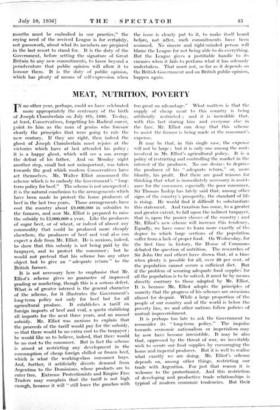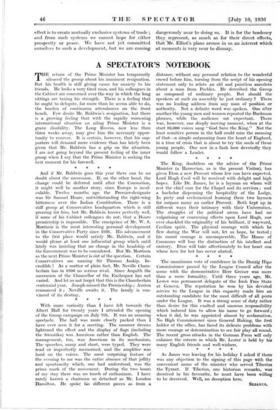MEAT, NUTRITION, POVERTY
-IN-no, other year, perhaps, could we have celebrated more appropriately the centenary of the birth of Joseph. Chamberlain on July 8th, 1836. To-day, at least, Conservatives, forgetting his Radical career, .Foint to him as the man of genius who foresaw clearly the principles that were going to rule the new century. If they are right, then indeed the ghost of Joseph Chamberlain . must rejoice at the victories which have at last attended his policy ; it is a happy ghost, which will see a son avenge the defeat of his father. And on Monday night another step, small but not unimportant, was taken towards the goal which modern Conservatives have set themselves. Mr. Walter Elliot announced the scheme which is to embody the Government's " long- term policy for beef." The scheme is not unexpected ; it is the natural conclusion to the arrangements which have been made to protect the home producers of beef in the last two years. Those arrangements have cost the country about £9,000,000 in subsidies to the farmers, and now Mr. Elliot is prepared to raise the subsidy to £5,000,000 a year. Like the producers of sugar beet, or of wheat, or indeed of almost any commodity that could be produced more cheaply elsewhere, the producers of beef and veal al io can expect a dole from Mr. Elliot. He is anxious, indeed, to show that this subsidy is not being paid by the taxpayer, and to protect the consumer ; but he would not pretend that his scheme has any other object abut to give an " adequate return " to the British farmer.
. It is not necessary here to emphasise that Mr. Elliot's scheme gives no guarantee of improved grading or marketing, though this is a serious defect. What, is of greater interest is the general character of the scheme, for it illustrates the Government's long-term policy not only for beef but for all agricultural produce. It establishes a tariff on foreign imports of beef and veal, a quota stabilising all imports for the next three years, and an annual subsidy. Mr. Elliot was anxious to explain that the proceeds of the tariff would pay for the subsidy, so that there would be no extra cost to the taxpayer ; he would like us to believe, indeed, that there would be no cost to the consumer. But in fact the scheme is aimed at restricting any development in the consumption of cheap foreign chilled or frozen beef, which is what the working-class consumer buys. And, further, it artificially diverts demand from Argentina to the Dominions, whose products are to enter free. Extreme Protectionists and Empire Free Traders may complain that the tariff is not .high enough,. because it will " still leave the gauchos with too great an advantage." What matters is that the supply of cheap meat to this country is being artificially restricted ; and it is incredible that, with this fact staring him and everyone else in the face, Mr. Elliot can deny that this scheme to assist the farmer is being made at the consumer's expense.
. It may be that, in this single case, the expense will not be large ; but it is only one among the costs involved in Mr. Elliot's agricultural policy. It is a policy of restricting and controlling the market in the interest of the producer. No one desire; to deprive the producer of his " adequate return," or, more bluntly, his profit. But there are good reasons for thinking that what is immediately necessary is assist- ance for the consumer, especially the poor consumer. Sir Thomas Inskip has lately said that, among other signs of the country's prosperity, the standard of life is rising. He would find it difficult to substantiate this statement. And taxation has come, to a greater and greater extent, to fall upon the indirect taxpayer, that is, upon the poorer classes of the country ; and Mr. Elliot's new scheme will increase this tendency. Equally, we have come to learn more exactly of the degree to which large sections of the populatiOn suffer from a lack of proper food. On Wednesday, for the first time in history, the House of Commons debated the question of nutrition. The researches of Sir John Orr and others have shown that, at a time when plenty is possible for all, over 20 per cent. of the population cannot secure a sufficient diet. But if the problem of securing adequate food supplies for all the population is to be solved, it must be by means directly contrary to those adopted by Mr. Elliot. It is because Mr. Elliot adopts the principles of scarcity that the progress of his schemes are occasions almost for despair. While a large proportion of the people of our country and of the world is below the poverty line, we and other nations follow policies of mutual impoverishment.
It is perhaps too late to ask the Government to reconsider its " long-term policy." The impulse towards economic nationalism or imperialism may by now have become irresistible. It may be also that, oppressed by the threat of war, we inevitably wish to secure our food supplies by encouraging the home and imperial producer. But it is well to realise what exactly we are doing. Mr. Elliot's scheme depends on, among other things, restricting our trade with Argentina. For just that reason it is welcome to the protectionist. And this restriction of developing and productive trade relationships is typical of modern economic tendencies. But their effect is to create mutually exclusive systems of trade ; and from such systems we cannot hope for either prosperity or peace. We have not Yet committed ourselves to such a development, but we are coming dangerously near to doing so. It is for the tendency they, represent, as much as for their direct effects, that lir. Elliot's plans arouse in us an interest which at moments is very near to dismay.











































 Previous page
Previous page